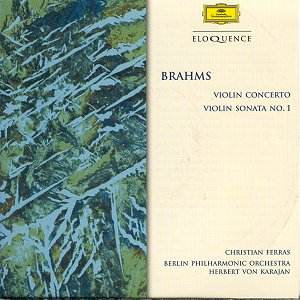Ferras’s Brahms Concerto has been a generally admired
account since its first appearance in 1964. He had an admirer as well
in Karajan who is at something approaching his best here, often commandingly
sensitive and thematically and textually revelatory. Ferras’ first entry
doesn’t however sound fully "centred" and the succeeding orchestral
soloists are rather unnaturally forward in the balance. But Karajan
is imaginatively effective at 5’15 where he gives real life and meaning
to the lower strings’ figure – and he is particularly good here and
elsewhere at points of contrastive material, one of his great strengths
as a concerto accompanist. Ferras’s vibrato is very fast and rather
inclined to the wavery-quavery kind, if I can put it that way, and it
has a slightly acidic tonal quality which confers a distinctive patina
to his playing. I respect his musicality whilst not being a huge admirer
of his tonal qualities.
There is a predictable weight to the orchestral contribution
before the first movement cadenza (the Kreisler) and there is a considerable
amount of orchestral incident audible, clearly but not officiously elucidated
by Karajan and never at the expense of the music’s own internal logic
and dynamism. Certainly this is not the quickest performance of the
first movement on record but correspondingly it never feels solemnly
or unnecessarily slow. The second movement sounds slightly too plush
though with rich solos from the orchestral principals and at 3’30 some
very saturated string interplay. Ferras’s slightly broken passagework
leads to – for once – clearly audible orchestral pizzicatos from 7’20.
The soloist is very expressive but not over succulent. It’s true as
well that there are some moments of over-perfumed relaxation in the
finale which co-exist with moments of dramatic insight and cogent delineation
of the musical argument. A sometimes provocative performance then, but
not a central recommendation.
The Sonata recording is extracted from the Ferras-Barbizet
set of all three. This is a fresh and generous traversal but Ferras
displays some of his intensely coiled and wavery vibrato once more which
can, even with Barbizet’s excellent support, somewhat vitiate a work
of this romantic impress. There is lyric intensity in profusion in the
adagio but a lack of tonal opulence. It remains of a piece with Ferras’s
interpretation of the Concerto and many will admire the more edgy and
nervous insight his kind of playing brings to the romantic literature.
Jonathan Woolf
AVAILABILITY
www.buywell.com


